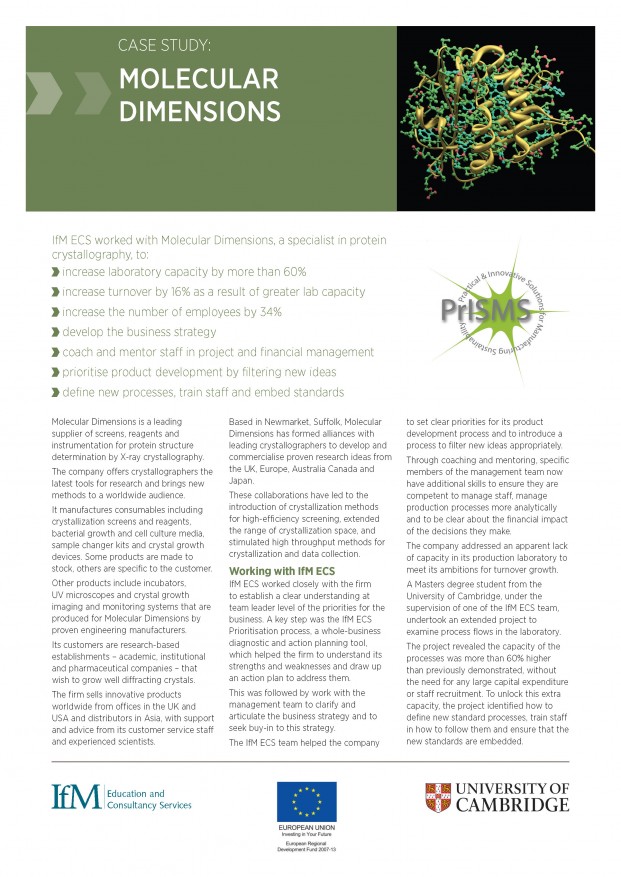Molecular Dimensions: doubling the laboratory capacity for protein crystallography specialists

Molecular Dimensions is one of more than 100 smaller manufacturers that IfM ECS is working with as part of the PrISMS programme – and this case study highlights the difference it has made. Molecular Dimensions is a leading supplier of screens, reagents and instrumentation for protein structure determination by X-ray crystallography. Its customers are research-based establishments – academic, institutional and pharmaceutical companies – that wish to grow well diffracting crystals.
IfM ECS worked with Molecular Dimensions as part of the PrISMS programme to:
|
increase laboratory capacity by more than 60% |
|
|
increase turnover by 16% as a result of greater lab capacity |
|
|
increase the number of employees by 34% |
|
|
develop the business strategy |
|
|
coach and mentor staff in project and financial management |
|
|
prioritise product development by filtering new ideas |
|
|
define new processes, train staff and embed standards. |
Molecular Dimensions is a leading supplier of screens, reagents and instrumentation for protein structure determination by X-ray crystallography. The company offers crystallographers the latest tools for research and brings new methods to a worldwide audience.
It manufactures consumables including crystallization screens and reagents, bacterial growth and cell culture media, sample changer kits and crystal growth devices. Some products are made to stock, others are specific to the customer. Other products include incubators, UV microscopes and crystal growth imaging and monitoring systems that are produced for Molecular Dimensions by proven engineering manufacturers.
Its customers are research-based establishments – academic, institutional and pharmaceutical companies – that wish to grow well diffracting crystals. The firm sells innovative products worldwide from offices in the UK and USA and distributors in Asia, with support and advice from its customer service staff and experienced scientists.
Based in Newmarket, Suffolk, Molecular Dimensions has formed alliances with leading crystallographers to develop and commercialise proven research ideas from the UK, Europe, Australia Canada and Japan. These collaborations have led to the introduction of crystallization methods for high-efficiency screening, extended the range of crystallization space, and stimulated high throughput methods for crystallization and data collection.

Working with IfM ECS
IfM ECS worked closely with the firm to establish a clear understanding at team leader level of the priorities for the business. A key step was the IfM ECS Prioritisation process, a whole-business diagnostic and action planning tool, which helped the firm to understand its strengths and weaknesses and draw up an action plan to address them.
This was followed by work with the management team to clarify and articulate the business strategy and to seek buy-in to this strategy. The IfM ECS team helped the company to set clear priorities for its product development process and to introduce a process to filter new ideas appropriately.
Through coaching and mentoring, specific members of the management team now have additional skills to ensure they are competent to manage staff, manage production processes more analytically and to be clear about the financial impact of the decisions they make.
The company addressed an apparent lack of capacity in its production laboratory to meet its ambitions for turnover growth. A Masters degree student from the University of Cambridge, under the supervision of one of the IfM ECS team, undertook an extended project to examine process flows in the laboratory. The project revealed the capacity of the processes was more than 60% higher than previously demonstrated, without the need for any large capital expenditure or staff recruitment. To unlock this extra capacity, the project identified how to define new standard processes, train staff in how to follow them and ensure that the new standards are embedded.
Boosting laboratory capacity
Of the products manufactured in-house screening kits (screens) experience the greatest demand and are the most complicated to manufacture in terms of balancing production processes. The supervised student project was focused on screen production but also attempted to address some of the wider issues in the laboratory.
The main changes implemented were:
|
New preparation sheet format to remove operator dependence on prior knowledge |
|
|
A refined list of 23 core buffer solutions and volumes to be made |
|
|
Reorganisation of buffer shelving |
|
|
Development of a spreadsheet to check for common buffers in kits |
|
|
Reduction of the dispensing robot wash cycle from four washes to two. |
The study showed the firm’s target to grow screen production by 66% over four years was realistic. In the long term the firm will move towards a lab that is more formalised and less dependant on operators’ knowledge of the production system. This review led to a change in thinking at Molecular Dimensions.
Tony Savill, president, says: “It led us to look at the lab more as a factory than as a laboratory.”
Production was split into three clearly defined stages – reagent preparation, dispensing, and labelling/packaging – to maximise production. The output of all three stages, and the overall production, is now measured on a daily basis. Tony says: “Originally, we were looking to see where the bottlenecks were in production. We eliminated all the bottlenecks, except for staff availability. That led us to employ additional staff to cover absences and address an increase in custom business.”
The company then addressed its strategic management and innovation strategy. IfM ECS helped to develop a project management process to assess potential new products at an early stage. The focus then switched to demand management. An organisational change led to a move from having two product managers (for consumables and for instruments) to a marketing manager and a chief scientist, and a production manager was appointed.
The firm is currently investigating radio-frequency identification (RFID) applications for some of its products with one of the Institute for Manufacturing’s research centres.
Almost three-quarters of the workforce are female, the firm offers flexible working practices and most employees live locally.
Tony says: “We have assessed the competences and priorities for the business. This has led to a roadmap for business development, the adoption of a formal project management system, increased production efficiency, a marketing plan focused on highest reward activities and a plan for product development. It is very useful to have access to resources like IfM ECS.
For more information on Molecular Dimensions visit here.
|
PrISMS The PrISMS (Practical & innovative Solutions for Manufacturing Sustainability) programme aims to transform the growth prospects of 50 start-ups and 70 smaller manufacturers across the Eastern Region – creating more than 140 new jobs and safeguarding many more. The programme is funded by the European Regional Development Fund (ERDF), with match funding from the EPSRC Centre for Innovative Manufacturing in Industrial Sustainability, ideaSpace and IfM Education and Consultancy Services (IfM ECS) and supported by 11 county and district councils in the region. It is managed and delivered by IfM ECS, which bases its methods on research at the University of Cambridge’s Institute for Manufacturing (IfM). For more information visit here. |
|
IfM ECS IfM Education and Consultancy Services works with companies of all sizes to help create and capture value and with national and regional governments to support and grow their industrial sectors. It does this by transferring the new ideas and approaches developed by researchers at the Institute for Manufacturing (IfM) through a programme of education and consultancy services. IfM ECS is owned by the University of Cambridge. Its profits are gifted to the University to fund future research activities. For more details on its work with SMEs visit here. |
|
ERDF PrISMS is part-financed by the East of England European Regional Development Fund (ERDF) Programme 2007-2013. The Department for Communities and Local Government is the managing authority for ERDF in England, which is one of the funds established by the European Commission to help local areas stimulate their local development by investing in projects which will support local businesses and create jobs. The East of England ERDF programme (covering Bedfordshire, Cambridgeshire, Essex, Hertfordshire, Norfolk and Suffolk) supports low carbon economic growth and has allocated approximately €95 million. |
Download the case study here.
For further information about the work of IfM ECS in the PrISMS programme please contact contact Nicky Athanassopoulou on +44 (0)1223 760376 or naa14@cam.ac.uk; or John McManus on +44 (0) 1223 764908 or jm694@cam.ac.uk.










